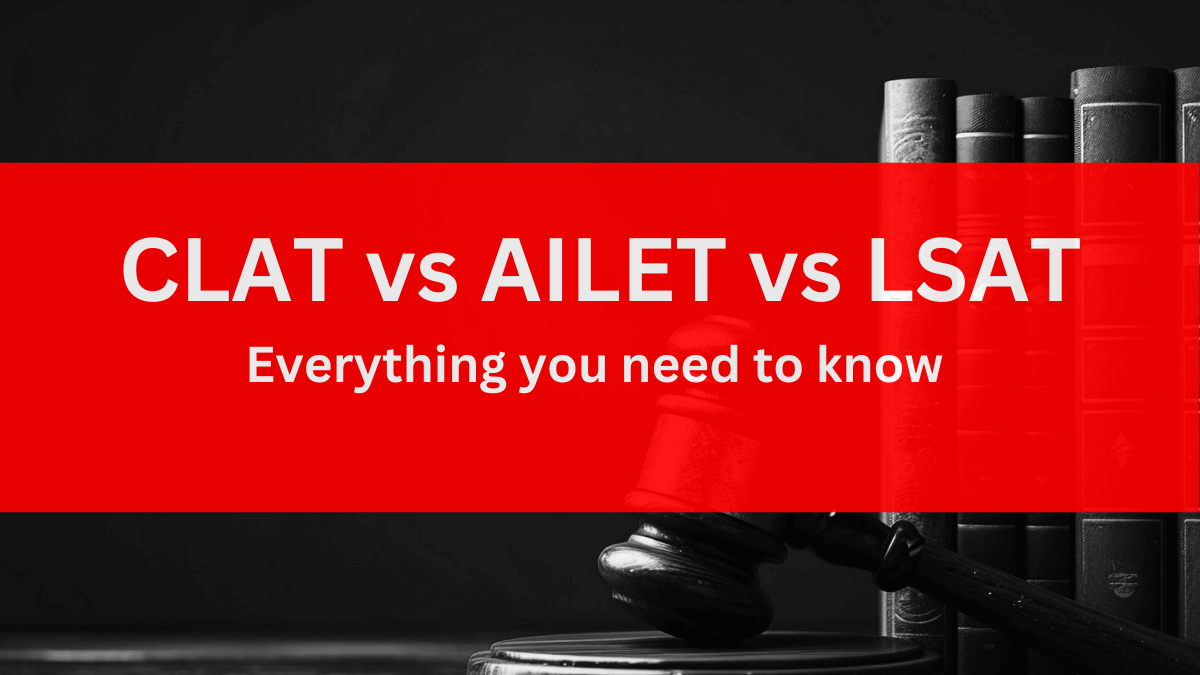CLAT vs AILET vs LSAT: Everything You Need to Know
The LSAT India test has been discontinued. Students looking to get admission to colleges that used to accept LSAT India should check in with the respective college authorities. For now, OP Jindal will be taking LNAT UK for its UG law intake.
CLAT vs AILET vs LSAT: Aspiring students are given various entrance exams when pursuing a law career in India. Three of the most prominent ones are the CLAT (Common Law Admission Test), AILET (All India Law Entrance Test), and LSAT (Law School Admission Test).

Each of these exams serves as a gateway to prestigious law colleges and universities, but they differ significantly in their structure, content, and the institutions they lead to. This blog post will delve into each exam, compare them, and help you decide what is best for your legal career.
Our expert will help you to understand and improve your overall law journey.
CLAT vs AILET vs LSAT: What are CLAT, AILET, and LSAT in India?
CLAT (Common Law Test) is a centralised national entrance law exam conducted by a coalition of National Law University (NLUs) for admissions in 24 NLUs. It includes undergraduate and postgraduate law programs for various NLUs. Except for NLU Delhi and NLU Meghalaya, it offers admission to every law school.
AILET (All India Law Entrance Test) is a national-level law exam to offer admission to candidates in the National Law University, Delhi (NLU-Delhi). NLU-Delhi conducts it. It offers courses 5-year integrated courses such as B.A. LLB (Hons), LL.M, and PhD programs also.
LSAT (Law School Admission Test) is a law entrance test recognised by various private schools in India for admission in courses like 3-year LLB, 5-year LLB, and LLM courses conducted by Law School Admission Council (LSAC). Law schools have accepted and recognised it since its establishment in 2009.
CLAT vs AILET vs LSAT India Exam Pattern and Syllabus
| Particulars | CLAT | AILET | LSAT India |
| Mode of Exam | Offline | Offline | Offline |
| Duration | 120 minutes (2 hours) | 120 minutes (2 hours) | 140 minutes (2 hours 20 minutes) |
| Questions Type | Objective (based on comprehension passages) | Objective | Objective |
| Syllabus |
|
|
|
| Negative Marking | -0.25 for the wrong answer | -0.25 for the wrong answer | No negative Marking |
| Total Questions | 120 | 150 | 92 |
| Total Marks | 120 | 150 | score range 420-480 and percentile |
| Difficulty Level | Moderate to Difficult | Difficult | Easy to Moderate |
CLAT vs AILET vs LSAT India Eligibility Criteria
The eligibility criteria vary for the CLAT, AILET, and LSAT India exams.
| Eligibility Framework | CLAT | AILET | LSAT India |
| Educational Qualification |
|
|
UG Courses: Class
12th/Graduation |
| Minimum Qualifying Marks |
|
|
UG Courses: 45-50%
(vary from college to college) |
| Age limit |
|
|
UG Courses: No age limit |
CLAT vs AILET vs LSAT India Courses Offered and Application Fee
CLAT, AILET, and LSAT India offer various integrated courses like 3-year LLB, LLM, PhD, 5-year integrated LLM, and many more. A detailed report is presented below.
| Particulars | CLAT | AILET | LSAT India |
| Level of Exam | National | National | National |
| Courses Offered |
|
|
|
| Course Duration |
|
|
|
| Associated Colleges | 24 NLUs | NLU Delhi | 26 private law schools |
| Examination Frequency | Once a year | Once a year | Twice a year |
| Application Fee | General Category – INR 4,000/- Reserved Category – INR 3,500/- | General Category – INR 3,050/-
Reserved Category – INR 1,050/- |
INR 3,799/-
|
Difference between CLAT, AILET and LSAT India Difficulty Level
| Law Exam Difficulty Parameters | CLAT | AILET | LSAT India |
| Difficulty level of questions | Moderate | Moderate to difficult | Moderate to difficult |
| Negative marking | -0.25 for incorrect answer | -0.25 for incorrect answer | No negative marking |
| Level of competition | Moderate
(approx. 60,000 candidates appear for over 3,500 seats of 22 NLUs) |
Difficult
(approx. 19,000 candidates appear for nearly 200 seats at NLU Delhi) |
Easy to moderate
(approx. 10,000 candidates appear for seats at over 25 associated colleges) |
| Overall difficulty level | Moderate to difficult | Difficult | Moderate |
Know more: LSAT Syllabus 2024: Exam Dates, Pattern and Colleges
Choosing the Right Exam for You
When deciding between CLAT, AILET, and LSAT, consider the following factors:
- Your Career Goals: If you aim to study at a variety of NLUs, CLAT is your best bet. For a focus on one of the premier law schools, AILET is ideal. If you are interested in diverse law schools and potentially studying abroad, LSAT offers broader opportunities.
- Your Strengths and Preferences: Consider whether you excel in a broad range of subjects (CLAT), have a strong interest in legal aptitude and general knowledge (AILET), or prefer focusing on reasoning and comprehension (LSAT).
- Preparation Time: Assess how much time you can dedicate to preparation and which exam aligns better with your study schedule and strengths.
- Institutional Preferences: Look at the specific law schools and their programs that interest you, as each exam offers different access to institutions.
Sign up for the live -online 2025 program is designed to efficiently build your overall skills.
Conclusion
Choosing between CLAT, AILET, and LSAT is a significant decision in your journey towards a career in law. Each exam offers unique opportunities and challenges, and your choice should align with your career aspirations, strengths, and preferred institutions.
- CLAT is ideal for those aiming for a broad range of NLUs and a comprehensive legal education.
- AILET is perfect for students aiming for admission to NLU Delhi and those who have a strong interest in legal aptitude and current affairs.
- LSAT is suited for students looking for a range of law schools, including opportunities for international studies.
No matter which exam you choose, thorough preparation, strategic study plans, and a clear understanding of your goals will be key to your success. Start early, stay focused, and remember that every path to becoming a lawyer is a journey with its rewards.
Happy studying, and best of luck on your legal career journey!







